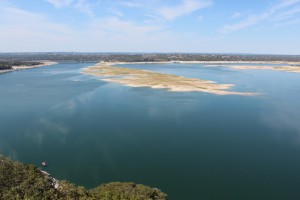Despite Delay in Vote, Little Change Expected in Proposed LCRA Water Plan

The LCRA operates the six dams on the Colorado River that form the scenic Highland Lakes of Central Texas. Photo by Reshma Kirpalani for KUT News and Reporting Texas
Water from the Highland Lakes is important to everyone in Central Texas — from urban Austinites to rural rice farmers downstream. Wednesday, the board of the Lower Colorado River Authority (LCRA) was set to vote on a much-delayed plan to manage that water, but the authority’s board postponed that vote to gather more public input.
The proposed plan, which would ensure that more water stays in the lakes in times of drought, is widely supported by upstream stakeholders, namely the City of Austin. But it’s unpopular downstream with agricultural interests that would likely see themselves cut off from water more often. The plan must ultimately be approved by the Texas Commission on Environmental Quality (TCEQ).
The LCRA board postponed the vote on the plan for thirty days until Sept. 17 to get more public input. But the board made it clear it doesn’t want to change the “framework of the plan” — including a provision to maintain “above 600,000 acre-feet of water” in the lakes. Under previous water plans, water could be sent to agricultural users even if storage dropped below that level.
The LCRA’s commitment to maintaining this and other key criteria (criteria that was mandated by the TCEQ) makes it unlikely that major changes in the plan will take place despite the extra input.
“We pretty much know what is in the plan, analysis has pretty much already been done by those who are paying attention and concerned about this,” says State Rep.Donna Howard.
Howard, a Democrat who represents House District 48 in Central Texas, wanted to see the water plan approved this week.
“I understand politically the reasons that you want to make sure all stakeholders are ensured appropriate access to the process,” she says.”But in reality I think it’s time to move forward.”
The four elements that the LCRA wants to keep consistent in the plan from this month to the next were outlined in an agency press release. They are:
-
Maintaining combined storage above 600,000 acre-feet through a repeat of historic hydrology;
-
Including additional hydrology through 2013;
-
Adding a 35,000 acre-foot per year demand associated with Corpus Christi’s Garwood water rights; and
-
Including a three-tier regime for interruptible agricultural customers that considers storage and inflow conditions, plus the use of a look-ahead test. The structure includes three curtailment conditions: extraordinary drought, less severe drought and normal conditions, for decisions on whether and how much stored water from the Highland Lakes would be available for interruptible customers.
The LCRA has operated under an emergency water management plan for the last several years since it first petitioned to amend the plan back in 2010. The authority presented drafts of the revisions in 2012, which was further revised and submitted yet again in May. It was sent back for revision by the TCEQ.
State law gives the TCEQ final approval authority over the water plan.

